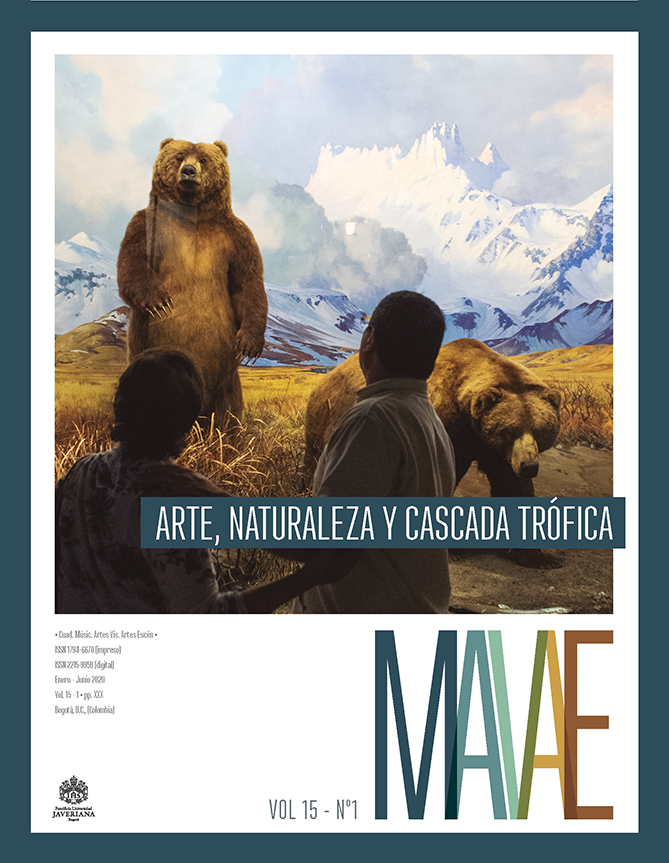Resumo
Quero desenvolver o convite deste número a pensar e refletir sobre estabelecer vínculos com diferentes sistemas de vida a partir de uma aproximação a certas práticas culturais e ações cotidianas de cuidado que se configuram desde o frágil e criam tecidos de solidariedade para habitar o mundo e manter a vida. Este argumento será desenvolvido através de duas etnografias que realizei em anos anteriores e que hoje quero reler e repensar a partir dessas problemáticas. O primeiro trabalho de campo é o resultado de um processo de abordagem audiovisual e etnográfica a dois movimentos sociais: a Comunidade de Paz de San José de Apartado e a Organização de Mulheres Wayuu Munsurat. O segundo trabalho é uma aproximação aos processos que emergiram das reclamações e demandas comuns por parte das mulheres que lideraram a tomada de terras nos anos 80 no bairro San Martin de Porres/Bogotá. As perguntas que me acompanharam ao longo destas pesquisas têm a ver com: como estas etnografias nos empurram a repensar e questionar o que estamos entendendo pelo político a partir do cuidado e suas possibilidades de reparar e criar vínculos diferentes entre territórios e corpos? E porque é necessário ter uma aproximação ao cuidado e sua relacionalidade com manter o corpo e os territórios? As ações e coalisões criadas e geradas por estas mulheres desde a vulnerabilidade tinham como principal objetivo se manter e sobreviver, ou seja, reparar os tecidos vitais. E é precisamente isto o que me interessa grandemente, o indagar nessa articulação entre o cuidado-como a necessidade de manter a vida- e
Carrasco, Cristina. 2001. “La sostenibilidad de la vida humana: ¿un asunto de mujeres?”. Mientras Tanto 82: 43-70.
Cortés Severino, Catalina y Laura Quintana. 2016. “Trasegares: una exploración por espacios cotidianos de la ciudad”. Cuadernos de Música, Artes Visuales y Artes Escénicas 11 (2): 51-73.
Federici, Silvia. 2014. La inacabada revolución feminista: mujeres, reproducción social y lucha por lo común. México: Ediciones desde abajo.
Giard, Luce. 2006. Hacer de comer. En La invención de lo cotidiano. Vol. 2: Habitar, cocinar, de Michel de Certeau, Luce Giard y Pierre Mayol. Madrid: Universidad Iberoamericana.
Gil, Javier. 2017. “Poéticas de lo cotidiano, estéticas de la vida”. Nómadas [Universidad Central - Colombia] (46): 212-225.
Guattari, Félix. 1989. Cartographies schizoanalytiques. París: Galilée.
Preciado, Paul B. 2008. “Cartografías queer: El flâneur perverso, la lesbiana topofóbica y la puta multicartográfica, o cómo hacer una cartografía ‘zorra’ con Annie Sprinkle”. En Cartografías disidentes, editado por José Miguel Cortés, 337-368. Barcelona: Seacex.
Riaño-Alcalá, Pilar. 2006. Dwellers of Memory: Youth and Violence in Medellin, Colombia. New Jersey: Transaction Publishers.
Esta revista científica se encuentra registrada bajo la licencia Creative Commons Reconocimiento 4.0 Internacional. Por lo tanto, esta obra se puede reproducir, distribuir y comunicar públicamente en formato digital, siempre que se reconozca el nombre de los autores y a la Pontificia Universidad Javeriana. Se permite citar, adaptar, transformar, autoarchivar, republicar y crear a partir del material, para cualquier finalidad, siempre que se reconozca adecuadamente la autoría, se proporcione un enlace a la obra original y se indique si se han realizado cambios. La Pontificia Universidad Javeriana no retiene los derechos sobre las obras publicadas y los contenidos son responsabilidad exclusiva de los autores, quienes conservan sus derechos morales, intelectuales, de privacidad y publicidad.
El aval sobre la intervención de la obra (revisión, corrección de estilo, traducción, diagramación) y su posterior divulgación se otorga mediante una licencia de uso y no a través de una cesión de derechos, lo que representa que la revista y la Pontificia Universidad Javeriana se eximen de cualquier responsabilidad que se pueda derivar de una mala práctica ética por parte de los autores. Como consecuencia de la protección brindada por la licencia de uso, la revista puede publicar retractaciones o corregir la información ya publicada. La publicación de contenidos en esta revista no representa regalías para los contribuyentes.



